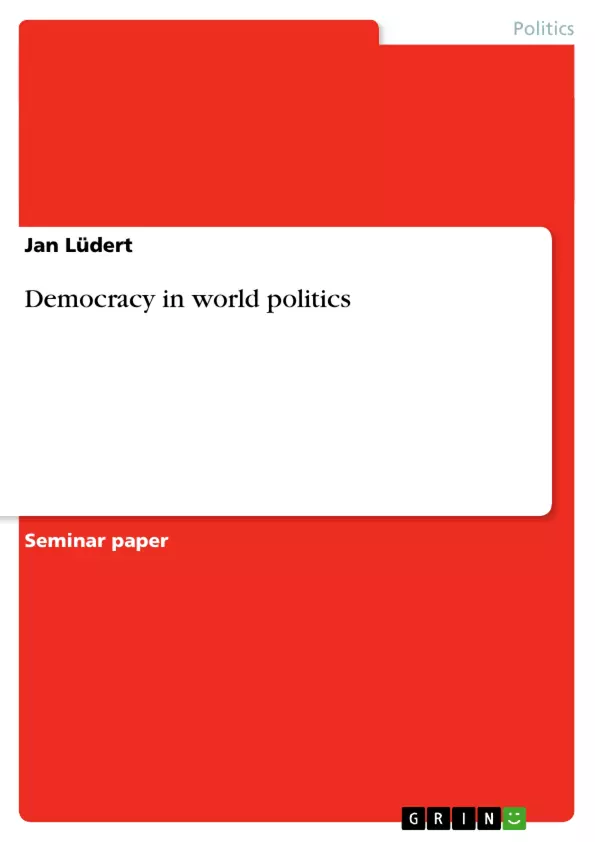This text concerns itself with answering two central questions of the democratic principle in the current arena of world politics. The questions are: Is international politics ultimately all about
power and interest, such that democracy
should
remain of marginal importance to international
relations?
And
If democratic states are ‘morally reliable’, do
we need democratisation of the international
system itself, or can we just rely on coalitions
of these ‘reliable’ states? The study of International Relations (IR) has long been concerned with Realpolitik, a form of
political realism, which puts the self-help (military power) and survival (interest) motives of
states at the centre of its inquiry to explain the structural realities of the anarchic international
system, which is seen to exist under a constant threat of war. (Waltz, 1979) [Market] liberalism,
on the other hand, opposes the realist tradition and aims for the emancipation of humanity. In the
liberal tradition, the authority of democratic nations and the proliferation of free-markets are
believed to need to extend to the international system, in order to bring about peace, security
(Fukuyama, 1989) and happy consumers. The Neo-conservatives within the US administration
seem to have embraced both realism and market liberalism and combined the two into a mesh
that is hard to disentangle. Therefore, an obvious observation of the current era of US hegemony
does indeed reaffirm that power and the interest of agencies in the international arena are
prominent attributes of international politics. Powerful states, such as the US in Iraq, wage
unilateral wars to secure their strategic interests and at the same time support market liberalism,
while the biggest beneficiaries, multinational corporations (MNCs), smile broadly in the
background. In this regard, it appears as if notions of democracy, power, and interest are not only
juxtaposed, but are in fact feeding on each other, perpetuating but one form of democracy – that
of market liberalism.
Inhaltsverzeichnis (Table of Contents)
- Democracy in World Politics
- Cosmopolitan Democracy
- Deliberative Democracy
- The Democratisation of the International System
- Cosmopolitan Institutional Design
- The Role of 'Morally Reliable' States
- Democratic Coalitions
Zielsetzung und Themenschwerpunkte (Objectives and Key Themes)
This paper argues that while international politics revolves around power and interest, it is important to think about how concepts of transnational democracy can be utilized to democratise the international systems in ways that represent the interest of the people and recognise them as the true foundation of authority.
- The role of power and interest in international relations
- The need for transnational democracy
- Cosmopolitan and deliberative approaches to democracy
- The democratisation of the international system
- The importance of 'morally reliable' states and democratic coalitions
Zusammenfassung der Kapitel (Chapter Summaries)
- Democracy in World Politics
- Cosmopolitan Democracy
- Deliberative Democracy
- The Democratisation of the International System
The paper begins by discussing the traditional realist view of international relations, which emphasizes the importance of power and interest. It then introduces the liberal perspective, which advocates for the expansion of democracy and free markets into the international system. The paper argues that the current era of US hegemony demonstrates the prominence of both power and market liberalism in international politics.
This section examines the concept of cosmopolitan democracy, which aims to establish a functional relationship and overlap of democratic governance on five different levels: local, state-wide, interstate, regional, and global. It discusses the role of international organizations, regional networks, and a potential world government in promoting democracy.
The section explores deliberative democracy, which emphasizes the importance of debate and discussion in shaping public opinion and decision-making. It argues that deliberative democracy can create 'reasonable, well-informed opinions' and promote 'inclusive, responsive, and responsible' global democracy.
The paper discusses the challenges and opportunities for democratising the international system in the context of globalization and the rise of democratic principles. It examines the role of 'morally reliable' states in promoting democracy and the importance of international institutions like the UN in ensuring accountability and legitimacy.
Schlüsselwörter (Keywords)
This paper focuses on the concepts of power, interest, democracy, transnational democracy, cosmopolitanism, deliberative democracy, global governance, international institutions, 'morally reliable' states, and democratic coalitions.
Frequently Asked Questions
What are the two central questions regarding democracy in world politics addressed in this text?
The text asks if international politics is solely about power and interest, making democracy marginal, and whether we need a democratized international system or can rely on coalitions of 'morally reliable' states.
What is the difference between the realist and liberal views in international relations?
Realism focuses on power, interest, and state survival in an anarchic system, while liberalism advocates for human emancipation through the expansion of democratic nations and free markets.
What is the concept of 'Cosmopolitan Democracy'?
It is a model that aims for democratic governance across five levels: local, state-wide, interstate, regional, and global, involving international organizations and potentially a world government.
How does 'Deliberative Democracy' contribute to global governance?
Deliberative democracy emphasizes debate and discussion to shape well-informed public opinions, promoting a more inclusive and responsible global democracy.
What role do 'morally reliable' states play?
The paper explores whether these states can act as a foundation for international security and if their coalitions are sufficient to maintain order without full system democratization.
- Citar trabajo
- Jan Lüdert (Autor), 2006, Democracy in world politics, Múnich, GRIN Verlag, https://www.grin.com/document/90076



